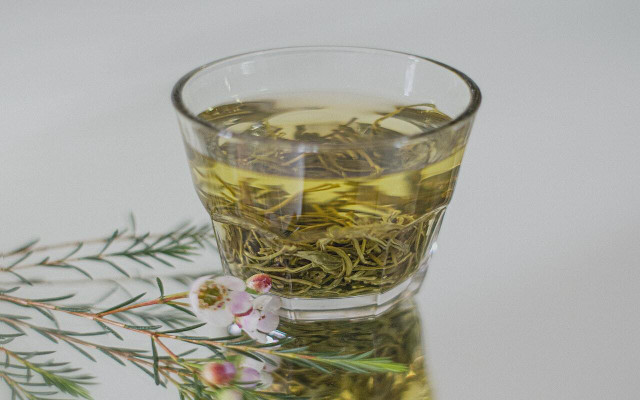Do you know how to make rosemary water for hair? Get faster hair growth and healthy, frizz-free tresses with this simple and natural DIY hair rinse.
Before countless hair-care products lined salon and drug store shelves, people relied on plants for their hair-care needs, including combatting dry scalp and getting rid of dandruff, promoting shine and encouraging hair growth.
Natural options provide an excellent choice when deciding what to put in or on your body, and rosemary is no exception. You might find that using rosemary water for your hair is the perfect choice for you. This herb is rich in beneficial compounds that not only promote hair health but also stimulate hair growth. So, let’s uncover the process of how to make rosemary water for hair — a DIY solution for longer, stronger locks.
Benefits of Rosemary Water for Hair

Many of the advantages of rosemary water come from the herb’s natural oils, which are abundant in beneficial compounds. If you don’t have access to fresh or dried rosemary, you can dilute rosemary essential oil with a carrier oil for similar results. Here are some of the key benefits of using rosemary for hair:
- Improved Hair Growth: Rosemary stimulates and improves circulation to the scalp, which is a great reason to use rosemary water for hair growth. A notable component, ursolic acid, increases scalp circulation, ensuring more nutrients reach the hair follicles. This fosters healthier, longer and stronger locks.
- Increased Shine: Due to its antibacterial qualities, rosemary can cleanse your hair and scalp, improving hair shine. This particularly benefits those seeking a natural solution to dull and lifeless hair.
- Soothed Scalp Issues: Whether you suffer from a dry, itchy scalp or dandruff, rosemary’s anti-inflammatory and anti-fungal properties may help soothe your skin. It promotes scalp health, mitigating common issues such as dandruff or scalp irritation.
- Reduced Frizz: Diluted rosemary oil can be a wonder for frizz and hard-to-control hair. By nourishing and hydrating the hair strands, it helps tame frizz and adds a natural smoothness to your locks.
In addition, studies have found rosemary oil to be as effective as minoxidil, a common ingredient in hair loss treatments. This suggests that rosemary can be a great natural alternative for those seeking chemical-free hair care solutions.
Now that we understand the incredible benefits of rosemary, let’s move on to the DIY guide on how to make rosemary water for hair.
How to Make Rosemary Water for Hair



This natural hair care treatment is simple and easy to whip up. Here’s everything you need to know about making rosemary water for hair:
Ingredients:
- A handful of fresh rosemary sprigs (or 2-3 tablespoons of dried rosemary)
- 2 cups of water
Method:
- Boiling: Start by boiling the water in a saucepan. Add your fresh or dried rosemary sprigs as the water comes to a boil.
- Simmer: Lower the heat and let the mixture simmer for 15-20 minutes. This process allows the rosemary’s essential oils and compounds to infuse into the water.
- Cool and Strain: After simmering, remove the saucepan from the heat and allow the rosemary water to cool. Once it is cool, strain the mixture into a glass jar or bottle, ensuring all rosemary bits are removed. Keep this part eco-friendly by using a sieve or cheesecloth alternative for the straining.
How to Use Rosemary Water for Hair Growth:
- As a Rinse: After shampooing and conditioning your hair, slowly pour the cooled rosemary water over your scalp and hair. Massage it in, making sure to cover all areas, then rinse it out with cool water. This rinse stimulates hair growth and leaves your hair with a refreshing, herbal scent.
- As a Spray: You can also pour your rosemary water into a spray bottle and use it as a refreshing hair spritz throughout the day. This helps keep your hair hydrated, shiny and encourages growth.
Tip: Keep your hair care routine sustainable — try our DIY shampoo bar recipe and DIY conditioner recipes.
When and How Often to Use Rosemary Water



This natural solution is gentle and is ideal for just about everyone. Rosemary tea targets the hair follicle, not the individual strand, making it suitable for all hair types, including color-treated and damaged hair. Rosemary is especially beneficial for people with oily hair, hair with breakage or damage or thinning hair. However, if you have thin hair, keep in mind that heavily concentrated rosemary tea may weigh your hair down.
Consistency is Key
For the best results, use your rosemary rinse or spray 2-3 times per week. Natural remedies can take time to show effects, so consistency is key.
Not only is this DIY solution cost-effective, but it also provides a natural, chemical-free alternative to commercial hair care products. Learning how to make rosemary water for hair can be a fun, therapeutic experience that benefits your hair health and growth. So why not give it a go?
Interested in more natural hair care solutions? Take a look:
- Discover the Magic of Flaxseed Oil for Your Hair
- How to Use Apple Cider Vinegar for Hair Care: Benefits and Hair Rinse Guide
- How to Get Soft, Silky, Shiny Hair: 8 Natural Tips
- How to Use Coconut Oil for Your Hair: 3 Tips
- Mango Butter for Hair: Benefits and Drawbacks
- Flyaway Hair: 6 Eco-Friendly Fixes
- No Poo Shampoo: Recipes for Shinier, Healthier Hair — Naturally
- How to Naturally Lighten Hair: Tips & Tricks
- How to Use Aloe Vera on Hair + Benefits & Drawbacks
Read more:
- 5 of Nestlé’s Worst Controversies Explained
- Ranked: 10 Most Expensive Sports Worldwide
- 10 Unexpected Benefits of Not Washing Your Hair
- How to Dry Rosemary at Home: 2 Easy Methods
Do you like this post?








